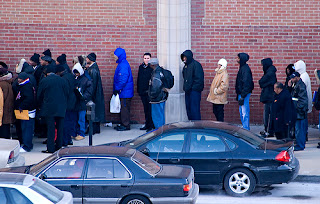While it might seem that we only interviewed visa applicants who were not German, there were a couple of categories of Germans who fell into the
interesting range. Germans who just completed high school,
Gymnasium in German, and who wanted to take a year off, a gap year, before beginning their university studies were
interesting. Back when I finished high school all the advisers, counselors, teachers, ministers, and parents preached against doing anything after high school that would delay beginning college studies. I always thought it was that they were concerned that if we started working right after high school, we'd get used to having our own money and would never want to be without the income. The result was that it was nearly unheard of for my classmates to do anything except head off to college in the fall after graduation.
But the Germans all wanted to take a break. They explained that completing their Gymnasium education was so stressful that they needed some time off to unwind before beginning further studies. There was one compelling argument for this approach that can be explained by comparing the university program of a typical American student with a typical European student.
The typical American student spends the first two years completing basic requirements, getting a feel for all the options available for majors, minors and so on. Many college freshmen don't declare what they expect their major to be until after the first year. And some change their declared major when half-way through, like I did when I changed my major from German to English (although the "as a Foreign Language" detail had to wait until I got to San Francisco State). With so many general education courses to get out of the way, there is plenty of time to get exposed to different subjects, to experiment, before buckling down in the final two years of college to complete the courses required for both a major and graduation.
The typical European student, however, must declare what their course of study will be immediately on entry into the university. Some universities accept students based on what they plan to study. Changing your major in many European universities means starting over. So it wasn't all that difficult to understand that recent German high school graduates would like to take a year off - to explore and experiment outside the university environment so they wouldn't waste time inside the university environment exploring and experimenting.
 |
| Used Car image by Thomas Hawk, via Flickr.com |
While I could understand why German graduates would want to take the time off, I couldn't understand what they would
do during an entire of traveling around the United States during their gap year and how they could afford the year off. Many a German recent graduate explained they would include a driving course with their year of traveling, with the goal of getting a driving license in the U.S. at which point they planned to buy a used car which they would use during their 6 to 12 months of driving around the U.S., after which they were convinced they would be able to sell the car for about what they paid for it so they would have money to return to Germany when they were ready to begin their university studies. I had to have this desire to get a driving license in the U.S. explained. In Germany, getting a driving license for the first time wasn't just a matter of taking a written test and then driving around a few blocks. In order to get a driving license in Germany, you had to know how a car works. Driving instruction in Germany included lessons on the internal combustion engine and required being able to do the work to maintain the engine yourself. It took a long time to complete all the courses, and the test included questions about the workings of the engine.
But if a German got a driving license somewhere else, they could skip all the hard stuff. With a valid license in their hands, Germans could apply for a replacement German license based on reciprocity. Once again, what had at first seemed strange was something I could understand.
But. . .
I also had to understand just what these young Germans were going to do in the United States for the many months they planned to spend there.
 |
Image of an au pair with an American family,
by ArcYang via Flickr.com |
One common plan involved staying with an American family for a year, watching over the children now and then in exchange for a place to stay and meals and often also some spending money. This is the life of an
au pair in Europe and it was a common way for young adults to travel to another country to live and learn the language of that country to get that experimentation and exploration out of the way. The term
au pair comes from French and means "equal to." The concept is that the person staying with the family is considered to be part of the family, not a domestic employee, and the work the au pair is expected to do is comparable to what a child in the family will be expected to do when they reach the age of the au pair. It is a nice system, but it isn't something well understood in the United States. At the time I was in Germany, there were no official programs that would permit a young person to travel to the U.S. as an
au pair. We considered anyone traveling to be an
au pair to require a work visa, not a tourist visa. So if we knew that was what the recent graduate was planning to do, we had no choice but to refuse the application for a tourist visa.
So they tried to hide the fact from us. They knew that if they told us the truth, we would turn down the visa. So they told us stories. Sometimes the story was that the applicant planned to stay with a distant relative who had agreed to give her a place to stay while she spent their time studying English. That was a believable scenario until the applicant couldn't explain which side of the family the relative was from. Sometimes the story was that the applicant planned to stay with someone who was a business partner of her father who had agreed. . . Again, the applicants rarely had worked out enough of a story to answer even the most cursory of questions. Sometimes the applicant would insist the family she was going to stay with didn't have any children. But while the words were saying one thing, the muscles of the face and body were saying something else. Sometimes the applicants would come for the interview chewing gum because they understood chewing gum would hide the slight tremors at the edge of the mouth when telling a lie. So we always asked applicants who were chewing gum to take it out and throw it away before continuing with the interview.
 |
| Image of an au pair's baggage by swperman, via Flickr.com |
Sometimes the lie was bigger - the applicant requested a visa for a short vacation with her parents so that there were no clues, they thought, that their plans were to stay beyond the length of time their parents would stay. But what the applicants didn't understand was that having a visa stamped in the passport wasn't a guarantee they would be admitted into the U.S. Now and then, when we did fall for the story and issue a visa, the applicant headed off for the U.S. with several suitcases to get them through the many months they hoped to stay with their host family while they studied English only to encounter an Immigration and Naturalization Services officer who had the authority to search their luggage to determine whether the story the applicant told us at the visa window matched what the applicant carried on the plane. If the INS official believed the purpose of the applicant's intended stay was inconsistent with the visa issued, they would refuse entry to the applicant and would send them right back to Germany. Fortunately we didn't have to meet with too many such applicants and their families, but we did meet a few who were thunderstuck that their plan for their daughter's gap year wasn't consistent with U.S. immigration law.
Not all
au pairs are women, but we never saw any patterns among young men who applied for visas during their gap year. Or maybe the guys were more clever than the girls.
Toward the end of my time in Stuttgart, a trial program for
au pairs began which gave us a better option than just turning down the applications. The trial program was an Exchange Visitor program which required that the applicant obtain a specific visa support document for the program through one of the organizations in the United States approved to issue those documents. The organizations were required to orient the
au pair participants as well as the host families to ensure the families didn't use the program as a way to get cheap domestic or child care help and that the
au pairs understood what household chores they would be expected to do and what was beyond that. The
au pairs also received a modest allowance through this program.
The existence of the
au pair Exchange Visitor program didn't solve all the problems because many times the family in the United States and the family in Germany did have a relationship so that the family in Germany only wanted their daughter to stay with that family and the family in the United States only wanted that specific
au pair. We did what we could.




















